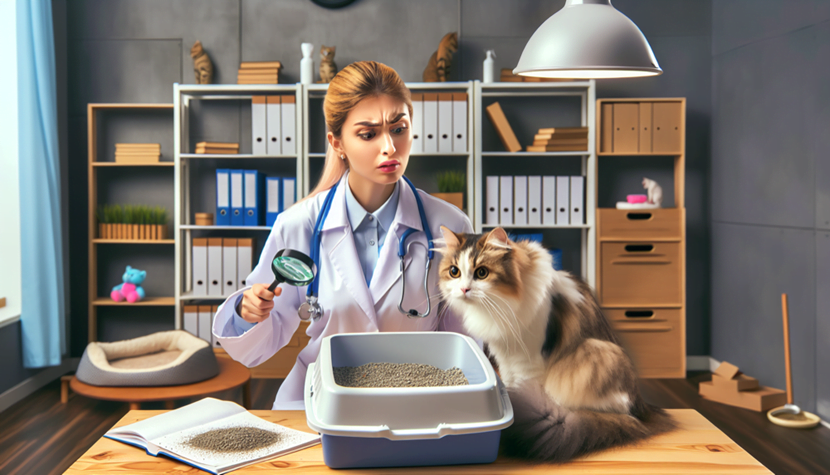Cats are typically fastidious creatures when it comes to their litter box habits, but occasionally, they may urinate outside the litter box, much to the frustration of their owners. This behavior can stem from various factors, including health issues, environmental anxiety, and litter-related problems, etc.
Health Issues
Cats may urinate outside the litter box due to underlying health problems, such as urinary tract infections (UTIs), bladder stones, or kidney disease. These conditions can cause discomfort or pain while urinating, prompting cats to avoid the litter box altogether. Therefore, Understanding these can help in addressing the issue effectively:
Urinary and Kidney Issues
- Urinary Tract Infections (UTIs), kidney stones, and bladder stones cause pain during urination
- Feline Interstitial Cystitis, a neurological disease, leads to frequent urination attempts and blood in urine
- Kidney or liver disease increases water intake, necessitating more frequent litter box visits
Endocrine and Metabolic Disorders
- Diseases like hyperthyroidism and diabetes mellitus result in increased urination
- These conditions can alter a cat’s metabolism, leading to changes in elimination habits
Age-Related and Physical Challenges
Addressing these medical issues often requires a combination of veterinary treatment and adjustments in care, such as diet changes, medication, or even surgery for conditions like bladder stones. Regular veterinary check-ups are essential for early detection and treatment of these conditions.
- Arthritis and other joint, muscle, or nerve disorders can make accessing the litter box difficult
- Cognitive decline in older cats may result in missing the litter box
Environmental Anxiety
Therefore,providing a serene space for your cat and gradually introducing changes can mitigate stress. Additionally, employing calming pheromones can help soothe an anxious cat.
- Changes in the cat’s environment or routine can trigger anxiety and stress, leading to inappropriate urination. Events like moving to a new home, the addition of a new pet, or loud noises can disrupt a cat’s sense of security, causing them to seek alternative places to relieve themselves.
Litter Box Issues
Regular cleaning, using effective odor removers, and strategic placement away from high-traffic areas are essential steps.
- A dirty litter box, the presence of old urine smells, or an unfavorably positioned litter box can deter cats from using it.
In multi-cat or large homes, having multiple litter boxes, experimenting with different litter box styles, and trying various litters can help identify the cat’s preferences.
- The number of litter boxes, their style, and the type of litter used also play a crucial role.
Choosing the Right Litter
So,it is important to use a high-quality cat litter.
- Cats have specific preferences when it comes to litter texture and depth. Some cats may dislike certain types of litter, such as those with strong scents or rough textures. Therefore, it’s essential to choose a high-quality cat litter that meets your cat’s needs and preferences.
Tofu Cat Litter

It is crafted from 95% high-quality, natural tofu, this litter leverages the power of nature to provide a superior solution for both you and your feline companion.
Why we recommend this litter
- Patented deodorization technology with superior odor-elimination
- Unbeatable clumping and absorption for effortless scooping
- Virtually Dust-Free for a cleaner, healthier environment
- Soft, natural tofu pellets for gentle comfort on paws
- Eco-friendly and biodegradable for a sustainable choice
- Convenient disposal through flushing
- Premium Ingredients: Crafted with high-quality, food-grade materials
- Customizable fragrance options
Therefore choosing a good cat litter can be very helpful in relieving your cat’s messy urination.
Territorial Marking
Addressing this requires understanding the underlying stress or anxiety triggers and may involve behavioral therapy or medication.
- Urinating outside the litter box can be a form of territorial marking for cats, especially in multi-cat households or in response to perceived threats from outdoor cats. By scent-marking their territory, cats assert their dominance and establish boundaries within their environment.
In conclusion
Addressing inappropriate urination in cats requires a multi-faceted approach. Consulting with a veterinarian is crucial to rule out any underlying health issues. Additionally, addressing environmental stressors, ensuring litter box cleanliness and suitability, and providing a calm and secure environment can help mitigate the problem. With patience, understanding, and proper intervention, cats can be encouraged to use the litter box consistently, fostering a harmonious relationship between feline companions and their owners.

